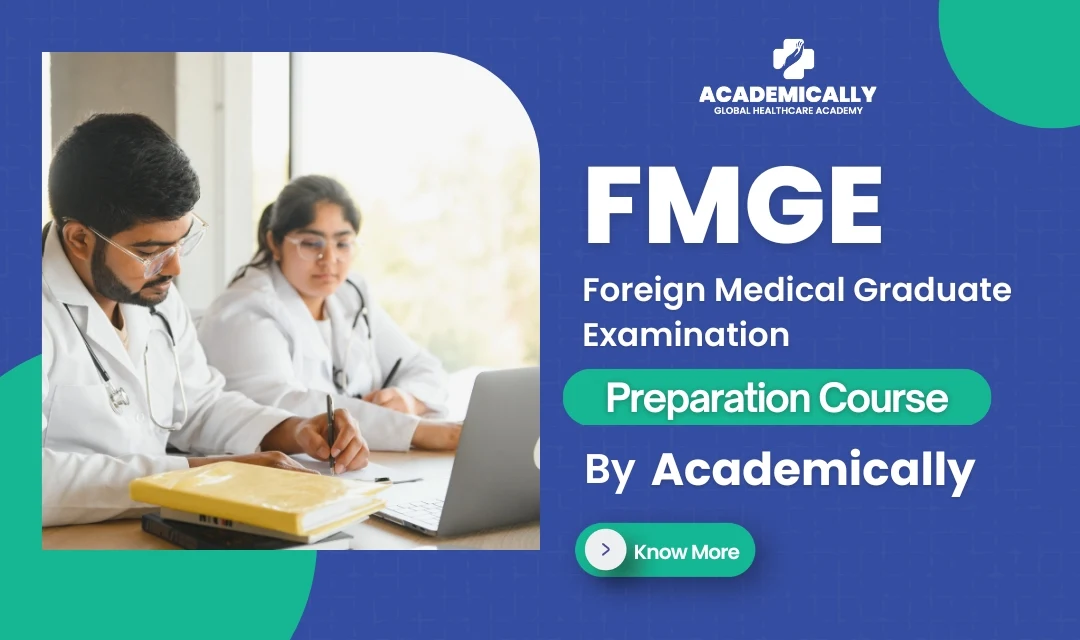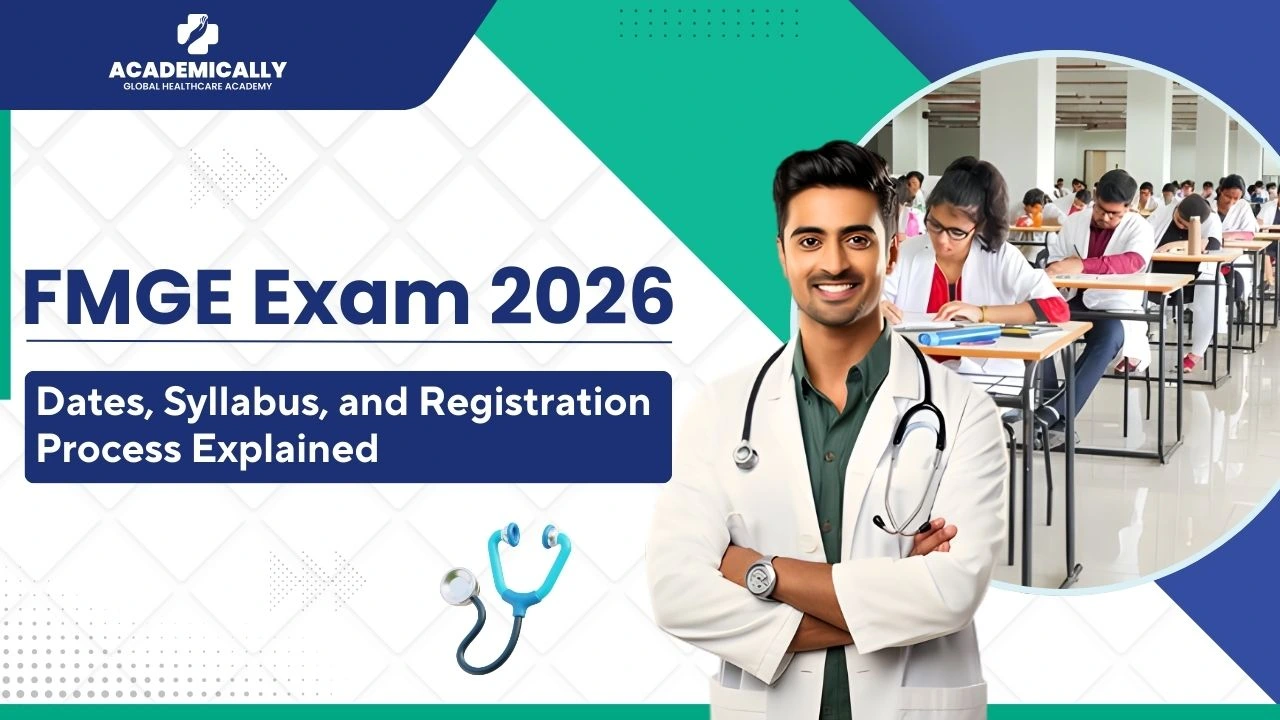The Foreign Medical Graduate Examination (FMGE) is one of the most significant steps for Indian students who have completed their medical education abroad and wish to practice medicine in India. Whether you are a fresh graduate, in the final year of your foreign medical program, or someone preparing to reattempt the exam, staying informed about FMGE 2026 is essential.
This blog provides a complete, detailed, and easy-to-understand guide on the exam dates, syllabus, eligibility criteria, and the registration process for FMGE 2026. Written in a clear and conversational tone, it aims to give you both clarity and confidence as you plan your preparation journey.
Understanding the FMGE Exam
The FMGE is conducted by the National Board of Examinations in Medical Sciences (NBEMS) as a licensing examination. Its purpose is simple: to assess whether a candidate who has completed medical education abroad possesses the minimum standards of knowledge required to practice medicine in India.
FMGE is held twice every year, once in June and once in December, which gives students flexibility in choosing their attempt based on their preparation and documentation status. With the NExT legislation being rolled out gradually, many aspirants wonder how long FMGE will stay in place. As of now, FMGE continues to be the valid licensure exam for foreign medical graduates, and until official notifications say otherwise, candidates appearing in 2026 must follow the FMGE pathway.
FMGE 2026 Exam Dates
While NBEMS will release the official dates on the website closer to the exam cycle, past trends allow us to estimate fairly accurate timelines for both sessions in 2026. Knowing these expected dates helps you plan your study routine, documentation, travel, and exam strategy better.
FMGE June 2026 Session
| Event | Date |
| Application Form Release | March 2026 |
| Application Window Closes | April 2026 |
| Edit Window (Correction Period) | April 2026 |
| Final Correction Window (for images) | April/May 2026 |
| Admit Card Release | May 2026 |
| Exam Date | Third or Fourth Week of June 2026 |
| Result Declaration | July 2026 |
FMGE December 2026 Session
| Event | Date |
| Application Form Release | October 2026 |
| Last Date to Apply | November 2026 |
| Correction Window | November 2026 |
| Final Correction Window | Late November 2026 |
| Admit Card Release | December 2026 |
| Exam Date | Third or Fourth Week of December 2026 |
| Result Declaration | January 2027 |

FMGE 2026 Syllabus: A Comprehensive Breakdown
The FMGE syllabus is extensive, mirroring the MBBS curriculum prescribed by the National Medical Commission (NMC). Unlike many competitive exams, FMGE does not usually surprise candidates with new topics or sudden changes. The syllabus remains consistent year after year, which allows for predictable preparation planning.
The examination covers 19 subjects, divided into Pre-clinical, Para-clinical, and Clinical categories.
Pre-Clinical Subjects
These subjects build the foundation for understanding the human body and its normal functioning. They include:
- Anatomy
Focuses on gross anatomy, embryology, histology, and neuroanatomy. - Physiology
Covers organ systems, cellular physiology, and mechanisms of body functions. - Biochemistry
Deals with metabolism, molecular biology, nutrition, and biochemical tests.
Together, these subjects contribute to understanding the basics of medical science, which further guides clinical reasoning.
Para-Clinical Subjects
These subjects help bridge the gap between basic sciences and clinical medicine.
- Pharmacology
Covers drugs, mechanisms, side effects, interactions, and therapeutic use. - Pathology
Includes general pathology, haematology, systemic pathology, and neoplasia. - Microbiology
Covers immunology, bacteriology, virology, mycology, and parasitology. - Forensic Medicine
Includes legal procedures, ethics, toxicology, and medical jurisprudence. - Community Medicine
Covers epidemiology, biostatistics, health programs, and preventive medicine.
These subjects are highly scoring in FMGE due to their direct application in clinical practice.
Clinical Subjects
This is the largest and most scoring segment of FMGE. It includes:
- General Medicine
- General Surgery
- Obstetrics and Gynaecology
- Pediatrics
- Orthopedics
- Ophthalmology
- ENT
- Dermatology and Venereology
- Psychiatry
- Radiology
- Anesthesia
Clinical subjects usually form the majority of repeated questions in the exam. Candidates often find that FMGE focuses more on basic clinical knowledge rather than rare or highly specialised topics.
Exam Pattern and Marking Scheme
Understanding the exam pattern is essential before starting full-time preparation.
| Parameter | Details |
| Mode of Exam | Computer-based |
| Total Questions | 300 |
| Type | Multiple-choice questions (single correct answer) |
| Marking Scheme | No negative marking |
| Sessions | Two parts of 150 questions each, conducted on the same day with a break |
| Passing Criteria | Minimum 150 out of 300 marks (50%) |
| Language | English |
Since there is no negative marking, FMGE is more about wide coverage than selective study.
Eligibility Criteria for FMGE 2026
To appear for the FMGE 2026 exam, candidates must meet the following eligibility requirements:
- Citizenship
The candidate must be an Indian citizen or an Overseas Citizen of India (OCI). - Primary Medical Qualification
The candidate must hold a recognized primary medical qualification from a foreign medical institution. - Recognition of the Qualification
The degree must be recognized and verified by the Indian Embassy in that country. - Registration Certificate
The candidate must possess a provisional or permanent registration certificate issued by the Foreign Medical Council. - Internship Requirement
Candidates must follow NMC internship policies applicable at the time of registration. In many cases, an internship in India is completed after passing FMGE. - Document Verification
All documents must be genuine, valid, and uploaded according to NBEMS specifications.
These criteria ensure that every FMGE aspirant comes from a legitimate medical program suitable for Indian licensure.
FMGE 2026 Registration Process: Detailed Step-by-Step Guide
The registration process for FMGE is done completely online through the official NBEMS portal. While the process is simple, it requires careful attention because errors in documentation or incorrect uploads can lead to rejection or the need for correction.
Below is a clear step-by-step explanation of the entire process.
Step 1: Visit the NBEMS Official Website
Select the FMGE section and click on New Registration once the application link is activated.
Step 2: Fill Out the Application Form
You will be required to enter the following details accurately:
- Full name (as per passport)
- Date of birth
- Gender
- Nationality
- Passport number
- Medical school details
- Year of joining and completion
- Internship status
- Contact information
It is important that the details match the candidate’s official documents to avoid discrepancies during verification.
Step 3: Upload the Required Documents
Candidates must upload scanned copies of all required documents in the correct format, resolution, and size. The documents generally include:
- Passport (first and last pages)
- Primary medical degree or provisional certificate
- Eligibility certificate (if applicable)
- Internship certificate or proof
- Medical transcripts
- Passport-size photograph
- Signature
- Thumb impression (if required)
NBEMS publishes detailed image guidelines, and candidates must follow them precisely to avoid their application being rejected during the image correction window.
Step 4: Pay the Examination Fee
The expected FMGE 2026 fee is around ₹6,200, inclusive of GST.
Payment can be made via:
- Credit card
- Debit card
- Net banking
Once the payment is successfully processed, a confirmation window appears.
Step 5: Select the Exam City
Candidates are given the choice of selecting their exam city. Since the centres are allocated on a first-come, first-served basis, early submission of the form helps secure the preferred location.
Step 6: Final Submission and Confirmation Page
After reviewing the entire application, candidates can submit the form. A confirmation page is generated, which must be downloaded and saved for future reference.
Step 7: Admit Card Download
The admit card is released a few days before the exam. Candidates must log in to their dashboard to download and print it. Along with the admit card, instructions regarding the exam day, reporting time, and protocols are provided.
How to Prepare Effectively for FMGE 2026
While FMGE is a qualifying exam, it is not easy. It requires strategic preparation, consistent revision, and good-quality study material. Here are practical recommendations to follow:
- Cover All Subjects Thoroughly
The exam is unpredictable in terms of subject weightage, so partial preparation is risky. - Study High-Yield Topics First
FMGE often repeats questions on foundational concepts. - Solve Previous Year Papers
This helps in understanding the type of questions asked. - Practice MCQs Daily
This builds speed, accuracy, and recall ability. - Take Mock Tests Regularly
Simulating the exam environment helps reduce anxiety and improves time management. - Revise Frequently
FMGE heavily tests retention; consistent revision is key. - Focus on Clinical Application
Many questions require understanding of basic clinical reasoning.
Parting thoughts
The FMGE Exam 2026 is a significant milestone for every foreign medical graduate aspiring to practice medicine in India. Understanding the exam dates, syllabus, eligibility criteria, and registration process helps eliminate confusion and gives you a clear roadmap for preparation. As the exam continues to be a mandatory licensing requirement, planning well in advance will give you an advantage over the intense competition.
Staying updated with NBEMS notifications, organizing your documents early, and following a structured study plan can transform your FMGE journey from overwhelming to achievable. With a consistent and smart preparation strategy, you can approach the FMGE 2026 with confidence and clarity.





